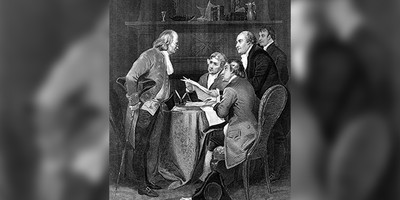People are praying in a city hall in Michigan, and atheists are up in arms. People of faith should hope the secularists push this into court, because this time the believers should win.
There’s something happening in Warren, Michigan. This town has been hit hard by layoffs, like the rest of the state. (Michigan’s unemployment rate is over 14%—the worst in the nation, thanks in no small part to Democratic Gov. Jennifer Granholm imposing big-government taxes, entitlements and union labor policies on the people there.)
Learning the hard way that government cannot meet every need, many in Warren are turning to the ultimate source for help. They’re praying. They’re asking God to provide for their material needs, and to comfort their families as they seek work.
Local church leaders have set up a booth in the atrium of city hall in Warren, where people can stop by and have someone pray with them. It’s a textbook example of churches ministering to those in need, going to the place where people in need are going for assistance.
But the local militant atheists will have none of that. They’re insisting on the city allowing them to set up a nearby booth in the atrium to be able to pass out literature hostile to religious faith.
That’s charity for you. Nothing says, “I’m here to help you” like a pamphlet telling you there is no afterlife, no ultimate justice, and that you’ll be rid of the burdens you bear only once your life ends, at which point you cease to exist.
Thanks, atheists. I feel better already.
If the city doesn’t allow them to set up their instant-downer booth, these atheists may sue. People of faith should hope that they do.
Nothing is a more predictable dividing line between liberal and conservative judges than religious actions in public. On some religious issues, this predictability allows experts to predict results before they happen.
Recommended
Church-and-state issues are based on the Establishment Clause. That provision of the First Amendment says that Congress cannot establish a national religion. In 1947, a narrowly-divided Supreme Court held that this prohibition also applies to cities and states.
There are two schools of thought on what the Establishment Clause means. The first is strict separation: religious expression should be strictly separate from any public places or government-supported activity. The other is accommodation: Government should be benevolently neutral toward all peaceful expressions of faith made in good will, and accommodate as much as possible those wishing to express their faith.
Supporters of strict separation seek to transform America into a strictly secular society, and have been gaining ground for forty years. Supporters of accommodation seek to restore a culture where expressions of faith are respected and where America’s religious heritage is honored, on the theory that the moral principles of a Judeo-Christian worldview are wholesome and beneficial for society.
Most judges fall entirely within one of these two schools. Judges favoring separation never see an expression of faith that they think is okay. Judges advocating accommodation find that most such expressions are just fine.
Until she left the Supreme Court in 2006, Justice Sandra Day O’Connor was one of the few judges who blended both schools of thought, almost always making her the swing vote in religion cases before the High Court.
Justice O’Connor developed what was called the endorsement test. To her, a public action involving faith was unconstitutional if it gave an observer the impression that the government endorsed whatever faith was being represented in the display. It was a moderately liberal standard that often struck down the display in question.
Now that Justice Samuel Alito has replaced O’Connor, the swing vote is Justice Anthony Kennedy. For Kennedy, the proper test is the coercion test, under which the challenged action is unconstitutional if it makes onlookers feel coerced to show support or agreement with it. It is a conservative-leaning moderate test that’s often far friendlier to religion.
These prayers being offered in Warren are a perfect example of something that would likely fail the endorsement test, but be upheld under the coercion test. So the people of Warren should press ahead with what they’re doing and deny the atheists’ request, because if this goes to court then Warren will likely win in the end.
The Obama administration’s failed policies are not delivering economic recovery, as the people in Michigan know all too well. The people in Warren are praying for change.
They’re not alone.

























Join the conversation as a VIP Member